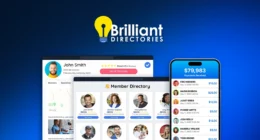Product marketing software provides essential tools for businesses to research markets, manage campaigns, and analyze customer data effectively. These platforms typically include features for automation, CRM integration, and cross-channel campaign management. Key components focus on customer targeting, performance analytics, and collaboration tools that help teams streamline their marketing efforts. Modern solutions also incorporate AI-driven insights and immersive technologies. Exploring these robust platforms reveals powerful ways to transform marketing strategies and boost ROI.
Quick Overview
- Product marketing software combines market research, campaign planning, and automation tools to streamline marketing operations and enhance customer engagement.
- Features include customer targeting, analytics dashboards, and CRM integration for data-driven decision-making and lead management.
- Marketing automation platforms help personalize customer interactions, automate repetitive tasks, and manage campaigns across multiple channels.
- Cross-team collaboration tools enable real-time communication, workflow management, and unified goal tracking for marketing teams.
- Advanced technologies like AI and predictive analytics help create targeted content and provide insights for better marketing strategies.
Understanding the Core Components of Product Marketing Software

Product marketing software consists of several essential components that work together to streamline and enhance marketing operations.
Modern marketing success relies on integrated software components working in harmony to deliver exceptional results.
The core elements include market research and analysis tools that collect customer data and provide competitor insights, alongside campaign planning features that enable strategic execution across multiple channels. Collaboration tools like real-time whiteboarding facilitate dynamic team planning and brainstorming sessions. Popular solutions like marketing automation platforms help businesses automate repetitive tasks and personalize customer interactions across channels.
Content creation and management functionality serves as another significant component, offering tools for developing and organizing marketing materials with proper version control.
The CRM integration component maintains customer relationships by tracking interactions and managing leads, while thorough analytics and reporting capabilities provide data-driven insights through customizable dashboards and performance metrics.
These components form an interconnected system that enables marketing teams to effectively plan, execute, and measure their product marketing initiatives while maintaining strong customer relationships.
Key Features That Drive Marketing Success
While successful product marketing requires many elements working in harmony, several key features stand out as essential drivers of marketing success in modern software solutions. The most impactful capabilities focus on audience understanding, campaign execution, and performance measurement. Leading companies like Apple Inc. demonstrate how strong brand loyalty can be leveraged through effective product marketing software. Email automation tools have become essential for businesses seeking to enhance customer engagement and drive conversions.
| Feature Category | Primary Function | Business Impact |
|---|---|---|
| Customer Targeting | Segment audiences | Higher conversion rates |
| Campaign Management | Streamline workflows | Improved efficiency |
| Analytics | Track performance | Data-driven decisions |
| Content Tools | Asset creation | Consistent messaging |
| Integration | Connect systems | Seamless operations |
These features work together to enable marketers to deliver personalized experiences, automate routine tasks, and measure results effectively. Modern solutions particularly excel in AI-powered predictive analytics and real-time personalization, helping teams identify and engage high-value customer segments while optimizing resource allocation.
Maximizing ROI Through Data-Driven Insights

Organizations that harness data-driven insights consistently achieve higher returns on their marketing investments. Through thorough data analysis, companies can track key performance indicators (KPIs), measure campaign effectiveness, and optimize their marketing strategies in real-time. Companies leveraging data-driven strategies experience 2-3 times greater revenue growth compared to their competitors. Leading platforms like real-time analytics from Adobe help enterprises make data-informed decisions quickly and effectively.
To maximize ROI, successful organizations focus on:
- Analyzing customer behavior patterns and preferences
- Implementing cross-channel attribution models
- Monitoring return on ad spend across platforms
- Testing and refining campaign performance through A/B testing
- Evaluating customer lifetime value metrics
Streamlining Cross-Team Collaboration
Successful marketing strategies require more than just data analysis – they demand seamless collaboration across multiple teams and departments. Modern product marketing software facilitates this cross-functional communication through integrated tools and shared platforms. Marketing automation platforms help teams coordinate campaigns and customer engagement across departments.
Data drives results, but true marketing success comes from teams working together seamlessly through integrated digital platforms.
Organizations can streamline collaboration by implementing unified KPI goals that align all teams toward common objectives. Tools like Asana, Monday, and Welcome enable smooth workflow management, while platforms such as Slack and Microsoft Office Online support real-time communication and document sharing. Video conferencing tools are essential for remote collaboration and virtual meetings.
Data-driven collaboration strengthens cross-departmental efforts by:
- Sharing marketing metrics across teams
- Combining insights from different business areas
- Tracking performance through marketing data hubs
- Using visual collaboration tools like Miro for planning
- Implementing project management solutions that connect teams and resources
This integrated approach breaks down silos and creates more efficient, coordinated marketing initiatives.
Emerging Technologies Shaping Product Marketing Tools

The rapid advancement of emerging technologies continues to revolutionize product marketing tools, transforming how businesses connect with customers and manage their marketing operations. Key innovations like AI-powered automation, AR/VR experiences, and blockchain solutions are reshaping the industry landscape.
| Technology | Primary Benefits | Key Applications |
|---|---|---|
| AI Marketing | Automated content creation | Predictive analytics |
| AR/VR | Immersive experiences | Virtual showrooms |
| Voice Tech | 24/7 customer support | Voice commerce |
| Blockchain | Data transparency | Supply chain tracking |
These technologies are enabling marketers to deliver more personalized experiences while improving operational efficiency. IoT devices provide valuable customer insights through real-time data collection, while voice-activated interfaces make product discovery more intuitive. Smart contracts and tokenized loyalty programs are building stronger customer relationships through enhanced trust and engagement. Advanced customer data platforms consolidate information from multiple sources to create comprehensive user profiles for more targeted marketing strategies. Implementing market trend analysis capabilities helps businesses stay ahead of industry shifts and adapt their product strategies accordingly.
Frequently Asked Questions
How Long Does It Typically Take to Implement Product Marketing Software?
Implementation timeframes for product marketing software vary greatly based on business size and complexity.
Small businesses typically complete basic implementations in 1-2 weeks, while mid-sized companies require 1-2 months.
Large enterprises often need 6+ months for thorough rollouts.
Key factors affecting timeline include existing infrastructure, customization needs, and data preparation requirements.
SaaS solutions generally deploy faster, sometimes in days, while complex enterprise systems may take several months.
What Security Measures Protect Customer Data Within Marketing Software Platforms?
Marketing software platforms employ multiple layers of security to protect customer data. These typically include:
- Data encryption using AES/RSA algorithms for both stored and transmitted information
- Role-based access controls with multi-factor authentication
- Regular security audits and compliance monitoring for GDPR, CCPA, and other regulations
- Secure API integrations and vendor assessments
- Extensive logging and monitoring systems
- Automated threat detection and prevention measures
These safeguards work together to maintain data privacy and security.
Can Product Marketing Software Integrate With Existing Legacy Systems?
Getting legacy systems to play ball with new software isn’t always easy, but it’s definitely possible.
Modern marketing platforms typically offer several integration methods including APIs, database connectors, and middleware solutions. While technical challenges exist, most legacy systems can be connected through careful planning and proper integration tools.
Companies should conduct thorough assessments first and consider a phased approach to minimize disruptions while maintaining data security and system functionality.
What Level of Technical Expertise Is Required to Operate These Tools?
Modern marketing tools generally require moderate technical expertise. Users should have basic digital literacy and familiarity with data analysis.
While advanced coding knowledge isn’t typically necessary, understanding marketing metrics, CRM systems, and basic analytics is essential. Most platforms offer user-friendly interfaces with drag-and-drop features, though some specialized functions may require additional training.
Many vendors provide extensive onboarding and support resources to help users maximize tool functionality.
How Often Should Companies Update Their Product Marketing Software Solutions?
While some companies update their software as often as their employees change their coffee filters, the ideal frequency depends on several key factors.
Most organizations should follow a quarterly update schedule, aligning with industry standards. However, market dynamics and user needs may necessitate monthly updates for competitive advantage.
Critical security patches should be implemented immediately, while feature enhancements can follow a planned schedule based on development capacity and user feedback.
Conclusion
Product marketing software has evolved from simple spreadsheets to sophisticated platforms that help teams work their magic. These tools transform raw data into actionable insights, turning marketing headaches into opportunities. As technology continues to advance, these solutions will only become more refined, helping companies navigate the ever-changing marketplace with greater finesse. The future looks bright for businesses ready to embrace these digital companions in their marketing journey.








